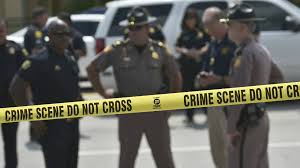
We’ve Proved Police Violence Against Black Communities, Now We Need a Culture Shift
thepurejustice 0 Comments Uncategorized
In 1966, James Baldwin wrote “I have witnessed and endured the brutality of the police many more times than once–but, of course, I cannot prove it.” He goes on to explain the problems with police accountability: They investigate and answer to themselves, not the community they’re supposed to be protecting.
Fast forward to 2022, where there are now requirements for police to have on body worn cameras. The community is extraordinarily proactive about capturing police brutality when it occurs, the evidence of brutality is spread far and wide for the world to see, yet, incidents like the brutal beating and death of Tyre Nichols continue to happen.
While proving violence has occurred is no longer the issue – there is still the problem Baldwin names that Black communities are not treated as the community police are meant to protect and serve. “If American Negroes are not part of the American community, then all of the American professions are a fraud,” Baldwin said.
Today, there is still a history and culture that not only protects, but promotes brutality among law enforcement officers, especially in communities of color. Historical patterns of discriminatory policing and enforcement mechanisms, including first the use of slavery and later the criminalization of Black people, have contributed to a legacy of mistrust and fear between law enforcement and Black communities. Racial profiling, excessive use of force, and other forms of police misconduct towards Black people are still prevalent.
Studies have shown that Black Americans are disproportionately subjected to stops, searches, and arrests by police, compared to their representation in the population. This has contributed to higher rates of incarceration for Black people, even for kids as young as elementary-school-age, leading to the widespread phenomenon known as the “school-to-prison pipeline.”
At every stage of life – from youth to adulthood – Black communities are forced to have more interactions with police. For example, the presence of police in schools has led to a criminalizing approach to student discipline, pushing students out of school and into the criminal justice system. Black students are disproportionately more likely than their white peers to be suspended, expelled, or arrested for the same kind of conduct. Interactions with the criminal system can affect future education and employment opportunities, overall contributing to a lower quality of life.
These issues have led to widespread protests and calls for systemic change, including calls to defund the police and invest in community-led solutions for public safety. First and foremost, we need accountability for every act of brutality, every single time. We should not be waiting on the edge of our seats to see whether someone who kills someone in broad daylight will be charged and convicted.
And of course, a serious public safety approach goes beyond stopping violent policing. When people have an affordable and consistent place to live, can count on safe and affordable child care, have the extra cash for after-school activities for their kids, can afford therapy and invest in their mental health – communities become much safer and secure and joyful places to live.
The exact number of Black men who have been harmed by police in the United States is difficult to determine, as comprehensive data on police use of force is often not publicly available, many incidents of police violence go unreported or undocumented, and statistics represent just a fraction of the total impact of policing on Black communities.
According to data from the Mapping Police Violence project, in 2021, Black men accounted for 26% of police killings, despite representing only 6% of the U.S. population. Additionally, research has found that Black men are 2.5 times more likely than white men to be killed by police.
Other studies have shown that Black men are also more likely to be subjected to excessive use of force, such as tasers or pepper spray, during police encounters. Furthermore, data on police stops, searches, and arrests also suggests that Black men are disproportionately affected by discriminatory policing practices.
So we’ve done the first part of proving the violence, as Baldwin said he was lacking. Now we need a culture shift.
As a country, we must decide what we want the mission of our police force to be. If it is to protect and serve all of our communities, that is the standard of conduct and accountability they must be held for. When we hire for any job, we ensure that our employees act according to our values – police officers, with the significant authority and responsibility they hold in society, should not be exempt. The community must be included in building new practices to ensure police are acting within the best interest of the public, are transparent, and are following the law.
This is what we should be putting our public resources into, not violent policing. True public safety means everyone feels safe and secure – physically, financially, and emotionally. We can end this cycle of senseless, racist violence. Only when a culture of accountability supersedes the one we have today can Black communities heal and have a good relationship with police.
Sasha Legette is a Co-Founder and the Executive Director for Pure Justice, an organization that uses community organizing and civic engagement to reform institutions and systems that perpetuate social and criminal injustices.